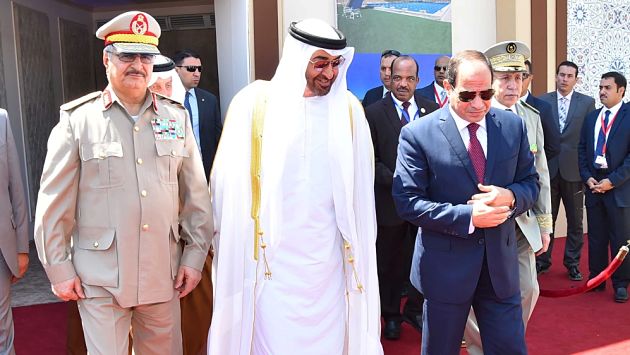As expected, yesterday’s defeat of Haftar’s forces in Al-Watiyah had dramatic consequences for their leader and his relations with his foreign sponsors.
The largest Egyptian opposition media outlet, Mada Masr, citing its confidential sources in the Egyptian ruling elite, reported that Egypt and the UAE are ready to withdraw their support from Khalifa Haftar and are asking the UK to help restore the peaceful political process that was previously disrupted by their actions when they hoped to achieve victory by force.
The effective actions of Turkish military advisors, drones and Libyan government forces backed by Syrian rebels provided by Ankara have led to the disruption of the military plans of the UAE, Russian Wagner soldiers and French advisors supporting Haftar.
Libya expert Jalil Harhaoui believes that only the full-scale intervention of the Egyptian army on Haftar’s side could change the current situation, but according to information from Cairo, its leadership intends to refrain from this unless there is a threat to Egypt’s borders.
Moreover, according to some Turkish media reports, Abdel Fattah el-Sisi’s regime is currently trying to explore the possibility of normalizing relations with Turkey. However, after the actual assassination of the legitimate President Mohammed Morsi, who was a friend of Turkish President Recep Tayyip Erdogan, this may prove to be an extremely difficult task.
It can be assumed that Ankara, feeling its superiority due to its successes in Libya, may set conditions for such normalization, such as the release of political prisoners and a softening of its policy towards the Egyptian Muslim Brotherhood, which would be extremely uncomfortable for Sisi.
All of this directly affects the prospects of the UAE’s policy, not only in Libya but in the region as a whole. After all, it was they who, with their obsession to fight the Brotherhood, pushed Haftar’s junta to aggressive actions against the legitimate government and Turkey, just as they pushed the Egyptian junta to action or supported the Gulf countries’ blockade of Qatar, which they consider the center of the Brotherhood and an ally of Turkey.
However, when we talk about the UAE’s policy in this regard, we should specify who exactly we are talking about. And we are talking about the policy of Crown Prince Mohammed Bin Zayed, who plays roughly the same role in the UAE as Mohammed bin Salman plays in Saudi Arabia.
These two people are obsessed with fighting the Brotherhood in the region, but if in Saudi Arabia, with its personalized system of power, this cannot be opposed, then in the UAE, which is a federation of several emirates where the hereditary princes have their voice, the aggressive foreign policy of Mohammed Bin Zayed has long been criticized by part of the establishment.
In this situation, the recent assassination attempt on UAE Foreign Minister Abdullah bin Zayed Al Nahyan, whose car exploded while he was driving in Abu Dhabi, does not seem to be a coincidence.
Along with Mohammed bin Zayed, this person embodies the current impasse in the Emirates’ foreign policy. And since the assassination attempt was organized in the UAE itself and clearly by the Emiratis themselves, one can assume that part of the Emirati establishment is trying to get rid of odious figures who are causing more and more problems for their country.
(In the photo: Khalifa Haftar, Mohammed bin Zayed, Abdel Fattah el-Sisi)

